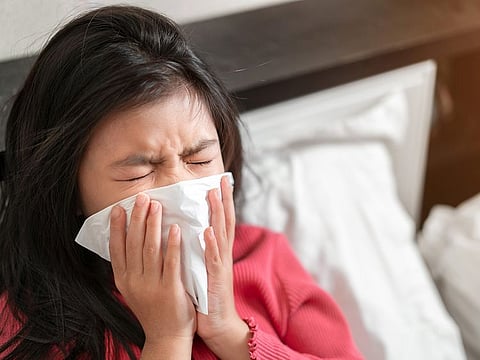Colds, coughs and flu: UAE doctors see more children, adults falling sick as weather changes
Precautions taken for COVID-19, flu jab can avert influenza, respiratory viral diseases

Dubai: As the winter season takes hold, physicians in the UAE are noting a surge in cases of coughs, colds, and influenza affecting individuals of all ages, from children to adults.
“It is the usual pattern during the flu season,” noted Dr Ashla Thomas, specialist paediatrician at Lifeline Clinic, Al Barsha.
“Usually, with the weather changes, we see more patients with high fever, cold and other flu-like symptoms. As a paediatrician, I am seeing more young kids falling sick these days,” she told Gulf News.
According to her, the majority of the patients reporting to the clinic with fever and respiratory illness are getting tested positive for influenza.
Season infections, allergies
“As we transition from the summer weather into winter in the UAE, it is essential that you stay informed about the various infections and allergies, primarily viral respiratory infections like the influenza viruses which are common in this period,” said Dr Olayiwola Babatunde Emmanuel, a general practitioner with City Relief Express Clinic in Deira.
WHAT IS INFLUENZA
Influenza, commonly referred to as flu, peaks around October and February and it causes symptoms like sudden onset of fever, dry cough, headache, muscle and joint pain, feeling unwell and sore throat, with the cough and cold persistent for about two weeks these days, he pointed out.
Dr Faaris Ahamed Leon, general practitioner with NMC Amala Medical Centre, Al Quoz, said his clinic had started seeing an increase in the footfalls of patients with viral respiratory illnesses since the last week of September itself.
“We have been getting patients of all ages, including small kids and elderly patients. School-going kids and their family members are getting sick and they are coming back in a cycle due to the spread of infections within the family.”
Review and test
He said most patients are presenting with very high fever, with colds coughs and other flu-like symptoms.
“Some patients are presenting with nausea and vomiting. These types of patients with high fever, like temperatures of 39 to 40 degrees Celsius, are having severe body pain also.”
If the patients’ fever does not settle in one or two days, Dr Leon said, they are called back for a review and then a swab test and a blood test are done.
“Most of these patients are turning positive for influenza A these days, and some, especially children, are tested positive for influenza B. Then we start antiviral tablets, mainly Tamiflu.
"Those with viral infections are getting secondary bacterial infections—colds and coughs and they get wheezing also especially if they are already asthmatic. Many are feeling joint pain and tiredness for over a week.”
Kids at higher risk
He said the good thing is that people are getting cured soon with medicines.
“Only kids with lower immunity are getting hospitalised with pneumonia. In adults, we don’t see such cases.”
Dr Thomas also highlighted that flu poses a significant concern for children, especially during the winter season.
“Young children, with their developing immune systems, are more susceptible to this highly contagious respiratory virus.”
The symptoms can be high fever, runny nose, cough, body aches and fatigue, she said.
“Kids catch most of the infections through nurseries, schools and playgrounds. Some children can get quite sick and need hospitalisation and some can develop complications as well. It can also cause missed school days, disrupted routines, and strain on families. Moreover, children can transmit infection to other family members, especially elderly people. So it’s super important for kids to get the flu vaccine.
"It doesn’t make them completely immune, but it does make the illness less severe and keeps them and others safer. Family members also get infected from workplaces, shared apartments and public areas,”
Boost immunity, take precautions
Whether they are kids or adults, it is important to boost immunity during the flu season, the doctors said.
“Start your day with a glass of warm water, take soups and hot beverages instead of cold drinks. Eat more fruits, especially citrus ones like oranges and lemons. It is important to keep yourself fit and have a balanced diet and get enough sleep to boost your immunity,” said Dr Emmanuel.
Following good personal hygiene and maintaining cough etiquette are part of the preventive measures advised by the doctors. They pointed out that the lessons learnt during the COVID-19 pandemic can be helpful in preventing flu, common cold and cough.
“Now there is reduced adherence to public health measures such as mask-wearing and social distancing, which were more common during the COVID-19 pandemic, and that may have allowed the flu to spread more easily than in the past few years.
"The relaxation of these measures and increased social interaction have increased flu transmission. Apart from getting vaccinated to help reduce the spread of the flu, we need to remain vigilant and continue to practise good hygiene,” said Dr Thomas.
Mask and sanitiser
While it is not mandatory now to use masks or sanitisers, Dr Emmanuel said it is desirable to use them when the situation demands.
“Be sure to use hand sanitiser and a face mask to protect yourself when you know there are people who are sick and when you have symptoms of any of the viral diseases,” he pointed out.
Dr Leon said it is important to keep yourself hydrated. “We are also telling people to use masks when they go to crowded places and when people around are sick. People with initial symptoms like throat pain should gargle saline water and do steam inhalation.”
Urging residents to take precautions, he said more flu-like cases are expected in the winter months this year.
“We are expecting more patients this year because of the weather changes as we started seeing the cases prior to the onset of winter itself and it is expected to go on till February or March.”
Sign up for the Daily Briefing
Get the latest news and updates straight to your inbox






